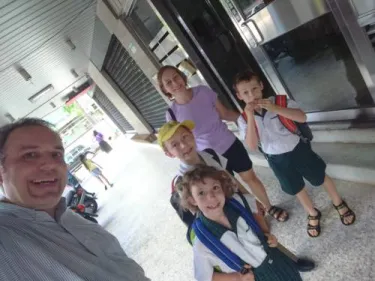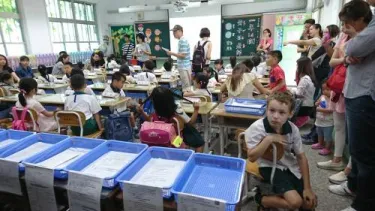These are the People in Your Neighborhood
A Letter from Jonathan Seitz, serving in Taiwan
Recently our kids started the new school year. For Sam, this meant a return to fourth grade at a bilingual school, but for Eva and Eli it meant the start of public school at Ren’ai Elementary School. This marks a milestone in our family, as all three kids are in primary school. Ren’ai Elementary is our neighborhood school, but it took a lot of help from the people in our neighborhood to get the twins enrolled there.

Do you remember Presbyterian Minister Fred Rogers’ famous song from his show “Mr. Rogers’ Neighborhood”?
These are the people in your neighborhood, in your neighborhood, in your neighborhood; oh, these are the people in your neighborhood; they’re the people that you meet when you’re walking down the street; they’re the people that you meet each day.
In this newsletter, we want to tell the story of the neighbors who helped us get the twins enrolled in their new school, which is also the story of our neighborhood.
First — the back story. A year ago, our previous landlord moved back to Taipei and said she needed her apartment; we would have to move out. We had time to move out, but it felt like a gigantic hassle. I had to return to Taiwan mid-interpretation, at our own expense; find a new apartment; and move, all within two weeks in May 2016. I quickly settled on an apartment next to a huge elementary school: Ren’ai. This school has 15 first grade classes, each with 30 kids. With six grades, it’s a school with 2000 students and around 100 teachers. We found out that it is also one of around 15 downtown schools that often fills up: enrollment is based on residency and other factors, and it isn’t guaranteed.
A number of people helped us navigate enrollment. Our friends, the parents of Eli’s kindergarten classmate, whose nickname is Bo niu, helped connect us to the school. The father is an alum of the school, their older son was already enrolled, and Bo niu, like Eli, was going to enroll for 1st grade. Eli’s teacher also called the school to explain the twins’ background. At first the school told us they were full. I was trying to figure out whether they were “really” full, or whether they just weren’t sure of the enrollment system for foreigners. When I asked whether any of the students were foreigners, one friendly teacher helpfully piped up that there were no “totally foreign” students (i.e. most kids have at least one Taiwanese parent and are in Taiwan’s “household registry” system). From the local neighborhood park where our kids play, we know Sean (who is from Cleveland, OH, and married to a Taiwanese woman) and his son Finn. Sean told us not to give up: visit the different government offices (immigration, housing, education) that handle this, and find out what the rules really are. He was insistent that if we kept at it, our odds of getting our twins in were “at least 75 percent.”
In our building, there is a friendly elderly gentleman who often hangs out in front of our building and chats up people as they come in and out. He’s sort of the informal town crier for our little block of Taipei. He has two grandsons at Ren’ai, in second and third grades. The boys had been registered under his address to enroll, which is common in Taiwan, and the grandpa often watches them after school. He introduced us to another set of twins in our building who attend Ren’ai and another family with kids at the school. His take was that if you can get to know some of the teachers or administrators, then often the principal will let you enroll.
I also visited the Ministry of Education, which sets policy and is located in a Taipei government office downtown. There are rules in English on registration, but they’re outdated. I’d heard before that foreigners are treated preferentially, but this is not true. We learned that there is a system that allows foreigners to queue in the system based on when they updated the address for their visas. Emily chased down Immigration Department paperwork, and this was good enough to get us into the system.
In the end, we followed all of these people’s guidance: I visited the school several times and tried to be friendly; we made a lot of calls; we filled out the paperwork; and we learned the rules. We attended a community festival at the school and tried to make as many connections as possible. After more visits and more paperwork, we were able to get Eva and Eli enrolled.
When we returned from our summer of IA in the U.S. just over a week ago, the couple who owns the stationery store two doors down from our building helped us figure out the twins’ uniforms (the local stores all carry the uniforms) and school supplies.

Recently, we took the twins to their first day of school. One of the things that made us happy was meeting many of the people from our neighborhood who had supported us throughout the enrollment process. The kind enrollment officer who was initially skeptical about our chances gave us a warm welcome as we came in. Our neighbor, the friendly grandpa, found us as we made our way to class. Bo niu’s dad came over and said hello. And I ran into Sean at the school playground during a play break. Finn and Eli played together. I saw a dad from a local Presbyterian Church (Anhe Presbyterian) whose first and fourth graders go to Ren’ai. One of Eva’s classmates from kindergarten is in the classroom next door to hers.
Sometimes it takes a whole village to get twins enrolled at the local public school. The Bible is full of stories of unexpected grace. Water becomes wine. Five loaves and two fish feed a multitude. A woman grasps Jesus’ tunic and is healed. A Samaritan leper returns to give thanks. A father runs to embrace the prodigal son. A challenge of cross-cultural life is that our own abilities are often limited and we are not up to the task of doing the things we want to do. But God is up to those types of tasks. And as we start a new school year, we’re grateful for the community that has gotten us here.
Churches in the US are also part of our neighborhood. It means a lot to go to Paris, Illinois; or Sanford, North Carolina; or Cincinnati, Ohio, and see people who are familiar to us. We’re here because of your offerings and prayer. You are also an integral part of the larger world “neighborhood” on which we and other mission co-workers rely, and we ask for your continued financial and spiritual support.
Let us pray: Holy God, we thank you for helping us in daily life. When we encounter obstacles or barriers, we are grateful for the community that holds us and supports us. We pray for children throughout the world who need good schools, and for the communities that train and support our children. Amen.
Please read this important message from Jose Luis Casal, Director, Presbyterian World Mission
Dear Friend of Presbyterian Mission,
What a joy to send this letter! As Presbyterian World Mission’s new director, I thank God for your faithful support of our mission co-workers. The enclosed newsletter celebrates the work you made possible by your prayers, engagement, and generous financial gifts. We can’t thank you enough.
After I began in April, I met with mission co-workers and global partners and was blessed to see firsthand the mighty ways God is working through them! Our global partners are asking us to help them move forward with life-changing ministries. Because of your support, we can say “yes” to these creative and exciting initiatives.
I write to invite you to make an even deeper commitment to this work. First, would you make a year-end gift for the sending and support of our mission co-workers? We need your gifts to end the year strong. With your help, we filled two new mission co-worker positions and plan to recruit for others. The needs in the world are great, and World Mission is poised to answer the call to serve.
Second, would you ask your session to add our mission co-workers to your congregation’s mission budget for 2018 and beyond? Our mission co-workers serve three-year or four-year terms. Your multi-year commitment will encourage them greatly.
Our mission co-workers are funded entirely from the special gifts of individuals and congregations like yours. Now more than ever, we need your financial support.
In faith, our mission co-workers accepted a call to mission service. In faith, World Mission sent them to work with our global partners. In faith, will you also commit to support this work with your prayers and financial gifts?
With gratitude,
Jose Luis Casal
Director
P.S. Your gift will help meet critical needs of our global partners. Thank you!
